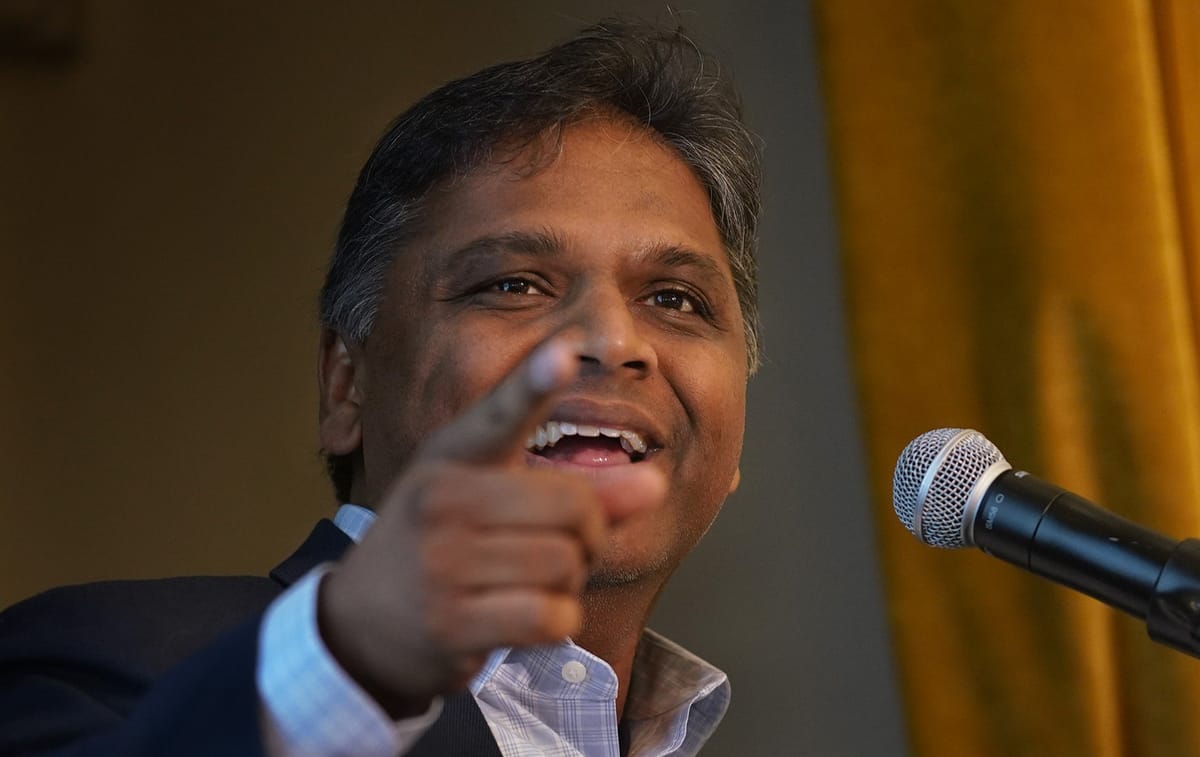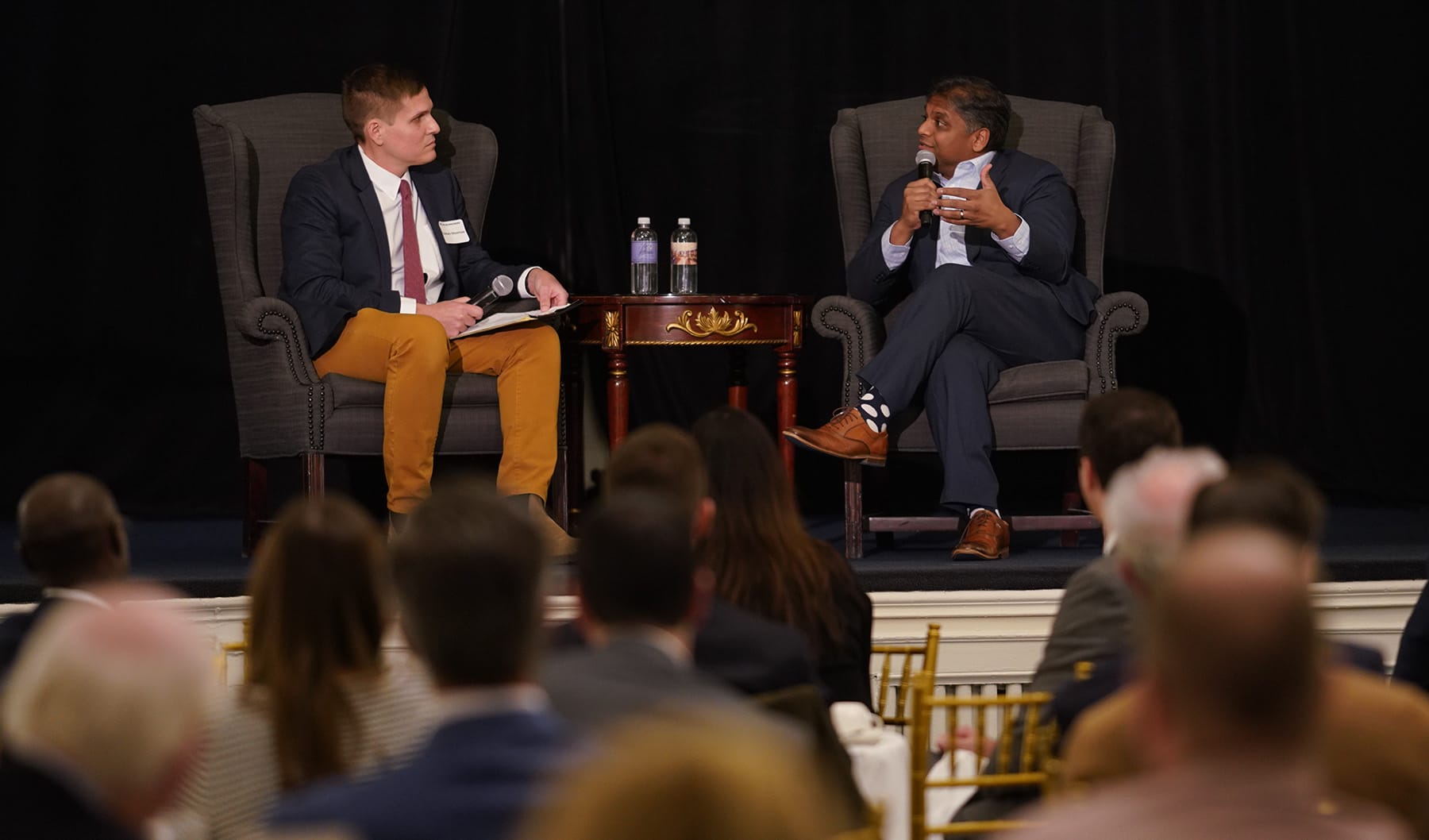Interview: As water crisis settles, Danny Avula prepares for the 'long haul' as mayor

Reflecting on his first weeks in office, Richmond Mayor Danny Avula acknowledged the significant financial and structural issues he is inheriting, but declared himself "full of optimism" on what's to come for the city and region.
In an on-stage interview with The Richmonder's Graham Moomaw, part of the outlet's "The (Real) State of the City" event, Avula said one silver lining of the water crisis was the ability to accurately assess his personnel in a real-world setting.
"It helped me understand how our team operates, and how our team responds in a crisis," Avula said. "And I think there were things that I saw that were very encouraging, and things that I saw that were very concerning."
He noted that while running Richmond's health department, he had his employees do emergency drill exercises and update policies on an annual basis.
"That probably happens in some departments of the city, but not as a whole," he said. He added: "I think a focus on building that emergency response, emergency preparedness culture will be front of mind."
Watch Part 1, on the water crisis:
Communication
Avula turned introspective when asked about communication at the beginning of the water crisis.
The mayor has been criticized for how his administration communicated the details and severity of the crisis to the public in its early days, including a Monday announcement of the boil water advisory hours after residents had already begun to see significant loss of water pressure and a Tuesday morning press conference where Avula and other officials suggested water could potentially be restored by the evening.
"I do think my way of seeing the world is pretty sunny, pretty optimistic," Avula said. "And some of the criticism I've heard was that I should have been more, just like, 'Here are the facts,' you know, and I think that's something I'm going to have to be aware of.
"I think part of what my role was, and part of why I think was effective during the COVID season, was this combination of being able to deliver factual information, but still give people a sense of, like, there is hope there. We are coming out of this. And I think that's really important for the relationship that the mayor has to their city. It's really important for the way the city communicates.
"And there's probably some fine tuning on the way I will learn to present, because this won't be the last crisis that we go through as a city."

Infrastructure council
Avula didn't scapegoat former Mayor Levar Stoney for the water crisis or other personnel mismanagement. He said he wants his team to be fully focused on rebuilding a sense of trust in local government, and said he plans to form an Infrastructure Council to evaluate what Richmond's priorities should be.
Avula carefully avoided pointing any fingers at former Mayor Levar Stoney for the crisis, saying, "My focus and interest is not in grading the last administration."
"My campaign was about, we're going to do the basics right. We're going to get the operations of government working well. We're going to be really thoughtful about the customer experience and customer service, and rebuilding this sense of trust that, 'My taxpayer dollars are being well spent, and I'm actually getting what I need from my local government,'" he said. "That lens has definitely widened a bit after this last week."
Pinpointing aging infrastructure as a key area his administration will need to zoom in on, Avula proposed establishing a new infrastructure council that would examine each of the city's basic services, from IT to water to gas, and determine what needs to be done to "avoid a situation like we just went through."
But fixes could prove expensive, he warned: One expert, he said, told him a robust regional water system could cost in the neighborhood of $10 billion.
He's hopeful that insurance payouts, as well as state and federal assistance, will help with the rebuild, but the water system will have to be evaluated alongside his other priorities.
"When we have that deep dive on infrastructure, we'll weigh that against some of our other priorities of affordable housing and investing in schools," he said. "We want to, and in many ways we need to, fund all of it. I think a big part of increasing demands is finding increasing revenues.
"I don't think any of us talked really extensively on the campaign trail about economic development, but the reality is, if we want to address housing affordability, if we want more money to invest in schools, if we need to upgrade IT systems, if we need to upgrade infrastructure, we need new revenue. So economic development has to be front and center for us."
Watch Part 2, on the city's finances:
A two-term mayor?
Acknowledging we are just days into the first term, Moomaw asked Avula if he sees himself running for re-election in four years.
"I think that it would be naive to think that you can do what the city needs done in a four-year term," Avula said. "I really would love to be here for the long haul and give as much and do as much and help move our city forward as much as I can.
"So yeah, I don't think I have any hesitation about saying, if I'm doing a good job, and people want me here, I would absolutely love to be here for eight years."
Avula's opening remarks noted that despite the challenges that face the city, he believes it is well positioned for success.
He also struck a note of regional cooperation, indicating that many of the challenges faced by Richmond are shared by Henrico, Chesterfield and other localities.
"I think there's clearly a sense of the work that is ahead of us, but at the same time, I mean, there's a sense of the incredible opportunity that's ahead of us," Avula said. "I think a lot of this next four years is going to be, how does the region really work together to lift everybody up?"






